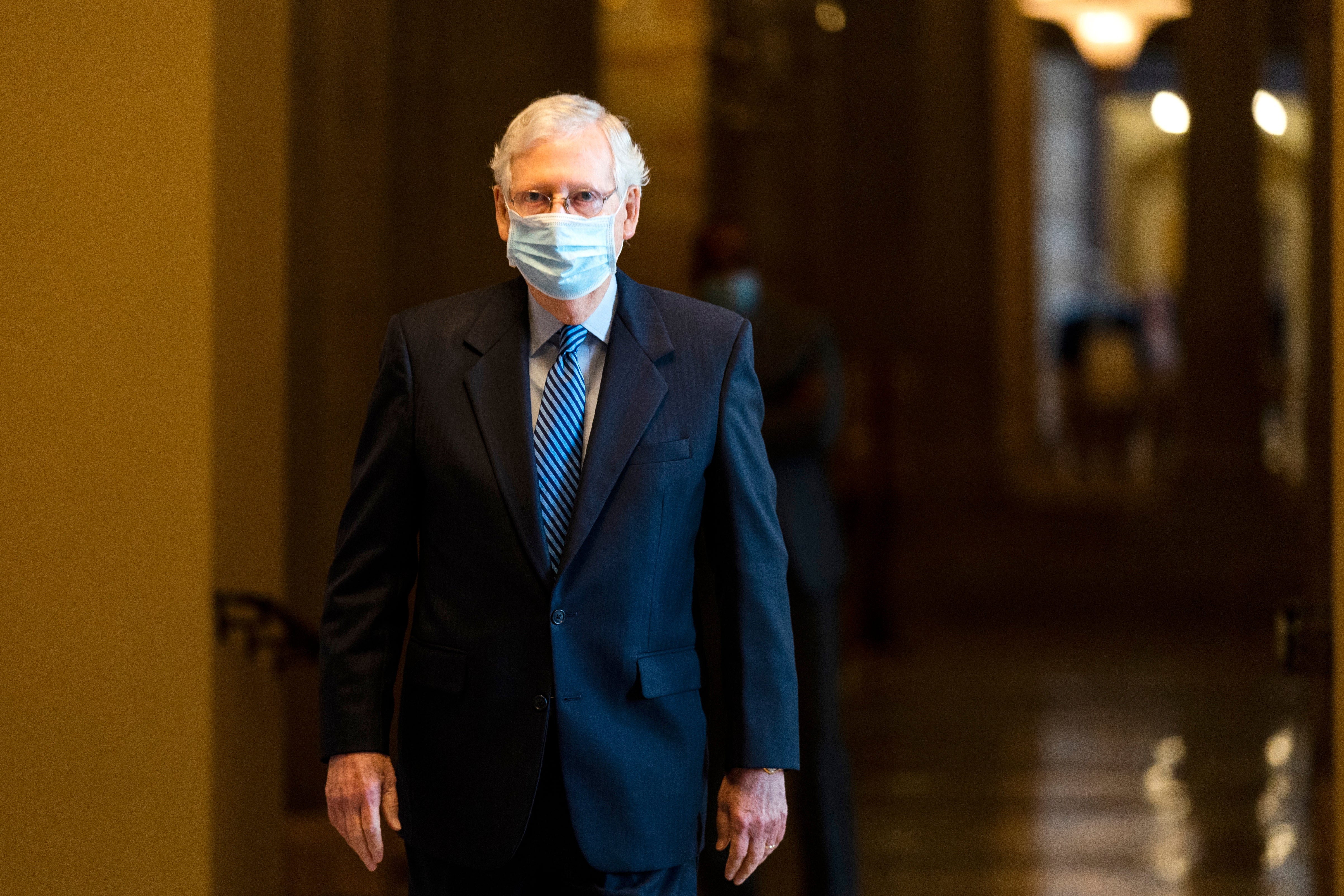Pandemic relief talks inch ahead but McConnell is resistant
President Donald Trump’s most powerful Senate ally is pressing the White House not to move ahead on a pandemic relief package

Negotiations on a huge COVID-19 relief bill have taken a modest step forward, though time is running out and Senate Majority Leader Mitch McConnell, President Donald Trump s most powerful Senate ally is pressing the White House not to move ahead.
McConnell told fellow Republicans that he has warned the White House not to divide Republicans by sealing a lopsided $2 trillion relief deal with House Speaker Nancy Pelosi before the election — even as he publicly said he'd slate any such agreement for a vote.
Pelosi's office said talks with Treasury Secretary Steven Mnuchin on Tuesday were productive, but other veteran lawmakers said there is still too much work to do and not enough time to do it to enact a relief bill by Election Day.
McConnell made his remarks during a private lunch with fellow Republicans, three people familiar with his comments said, requesting anonymity because the session was private.
The Kentucky Republican appears worried that an agreement between Pelosi and Mnuchin would drive a wedge between Republicans, forcing them to choose whether to support a Pelosi-blessed deal with Trump that would violate conservative positions they've stuck with for months. Many Republicans say they can't vote for another huge Pelosi-brokered agreement.
McConnell said if such a bill passed the Democratic-controlled House with Trump's blessing “we would put it on the floor of the Senate.” Those public remarks came after the private session with fellow Republicans.
Trump is hoping for an agreement before the election, eager to announce another round of $1,200 direct payments going out under his name, but it's increasingly clear that time has pretty much run out. If he wins, Trump is promising relief, but if he loses — as polls are indicating — it's unclear that his enthusiasm for delivering COVID aid will be as strong. Recent history suggests that any post-election lame-duck session in the event of a Trump loss wouldn't produce much.
“It's not a question of ‘íf.' It's a question of ‘when.'" said Senate GOP Whip John Thune of South Dakota. “We have to do more. We know that."
Pelosi said earlier Tuesday that she and Mnuchin remained at odds over refundable tax credits for the working poor and families with children, the size of a Democratic-sought aid package for state and local governments, and a liability shield for businesses and other organizations against lawsuits over their COVID preparations.
Pelosi's spokesman, Drew Hammill, wrote on Twitter that she and Mnuchin then spoke for 45 minutes and found “more clarity and common ground" and that “both sides are serious about finding a compromise." Another conversation is slated for Wednesday.
The Pelosi-Mnuchin talks also involve pandemic jobless aid, the second round of $1,200 direct payments, and money for schools, testing and vaccines.
Pelosi had said Tuesday was a deadline day, but clarified in an interview with Bloomberg News that the aim is to spur the two sides to exchange their best proposals on a host of unresolved issues, not to close out all of their disagreements or have final legislative language at hand.
“Let's see where we are," Pelosi said. “We all want to get an agreement."
Time is running out and Pelosi has instructed her committee chairs to try to iron out details, but the Senate GOP negotiators do not appear as eager as she is.
“It’s getting to be toward the last minute and the clock keeps ticking away,” Senate Appropriations Chairman Richard Shelby, R-Ala., said Tuesday. “I’m not optimistic about doing anything."
Aides familiar with the talks say the price tag for a potential Pelosi-Mnuchin deal is inching close to $2 trillion. Senate Republicans are recoiling at both the size of the measure and Pelosi's demands, even as Trump is beating the drums for an agreement.
“I want to do it even bigger than the Democrats. Not every Republican agrees," Trump said Tuesday on Fox News. "But they will.”
McConnell, meanwhile, is pushing ahead with votes this week on GOP measures that stand little chance of advancing. On Tuesday, the GOP-held chamber went on record in favor of another round of payroll subsidies for businesses such as restaurants and hotels that are having particular difficulty during the pandemic.
But while the vote put the Senate on record as supportive of the idea, it’s not aimed at advancing the measure through time-consuming procedural steps that could interfere with a floor schedule dominated by the nomination of Amy Coney Barrett to the Supreme Court.
On Wednesday, Trump’s GOP allies in the Senate are slated to support a revote on a virus proposal with a net cost of about $500 billion, though it does not include the $1,200 direct payments that are so important to Trump. But the Senate GOP bill has failed once before, and Trump himself says it's too puny.
The goodwill and bipartisanship that powered the $1.8 trillion bipartisan CARES Act into law in March has largely dissipated. It passed by an overwhelming margin as the economy went into lockdown. Since then, Trump and many of his GOP allies have focused on loosening social and economic restrictions as the key to recovery instead of more taxpayer-funded help.